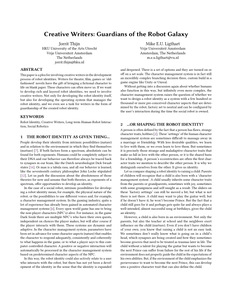A presentation regarding the potential for supporting the video game industry as part of the growth of the creative industries in the Brabant region, for bringing new workers to the region and for retaining skilled graduates.
DOCUMENT
The authors analyze the policy discourse on the utility of games for society at the level of the European Union, and for five EU countries, the Netherlands, the United Kingdom, Germany, Italy and Norway. The ongoing study is part of a Research Roadmap developed within the GALA Network of Excellence on Serious Games (2010-2014, EU FP7). The authors identify four policy discourses on the utility of serious games that they label as Technology Enhanced Learning; Creative Innovation; Social Inclusion and Empowerment and Complex Systems. The polcies applicable to SGs in the five European countries are briely described and compared. It was seen that some countries have explicit policies for SGs (the Netherlands, Germany); whereas most of the countries only have implicit policies not directly addressing SGs but which can be used to support SGs development and use.
DOCUMENT
The report from Inholland University is dedicated to the impacts of data-driven practices on non-journalistic media production and creative industries. It explores trends, showcases advancements, and highlights opportunities and threats in this dynamic landscape. Examining various stakeholders' perspectives provides actionable insights for navigating challenges and leveraging opportunities. Through curated showcases and analyses, the report underscores the transformative potential of data-driven work while addressing concerns such as copyright issues and AI's role in replacing human artists. The findings culminate in a comprehensive overview that guides informed decision-making in the creative industry.
MULTIFILE

This paper is a plea for involving creative writers in the developmentprocess of robot identities. Writers for theatre, film, games or ’old-fashioned’ novels have the gift of bringing a fictional character tolife on blank paper. These characters can often move us. If we wantto develop rich and layered robot identities, we need to involvecreative writers. Not only for developing the robot identity itself,but also for developing the operating system that manages therobot identity, and we even see a task for writers in the form ofguardianship of the created robot identity
DOCUMENT

Introduction: Given the complexity of teaching clinical reasoning to (future) healthcare professionals, the utilization of serious games has become popular for supporting clinical reasoning education. This scoping review outlines games designed to support teaching clinical reasoning in health professions education, with a specific emphasis on their alignment with the 8-step clinical reasoning cycle and the reflective practice framework, fundamental for effective learning. Methods: A scoping review using systematic searches across seven databases (PubMed, CINAHL, ERIC, PsycINFO, Scopus, Web of Science, and Embase) was conducted. Game characteristics, technical requirements, and incorporation of clinical reasoning cycle steps were analyzed. Additional game information was obtained from the authors. Results: Nineteen unique games emerged, primarily simulation and escape room genres. Most games incorporated the following clinical reasoning steps: patient consideration (step 1), cue collection (step 2), intervention (step 6), and outcome evaluation (step 7). Processing information (step 3) and understanding the patient’s problem (step 4) were less prevalent, while goal setting (step 5) and reflection (step 8) were least integrated. Conclusion: All serious games reviewed show potential for improving clinical reasoning skills, but thoughtful alignment with learning objectives and contextual factors is vital. While this study aids health professions educators in understanding how games may support teaching of clinical reasoning, further research is needed to optimize their effective use in education. Notably, most games lack explicit incorporation of all clinical reasoning cycle steps, especially reflection, limiting its role in reflective practice. Hence, we recommend prioritizing a systematic clinical reasoning model with explicit reflective steps when using serious games for teaching clinical reasoning.
DOCUMENT

An EU-Mexican panel discussing the needs of creative industries mid- and post-pandemic, and how the cultural sector is fundamental for the health and wellbeing of society. Discussions touched on employment, policy, and education, along with sector-specific opportunities and cross-sectoral challenges. The name 'creative industries' was challenged for its divergent uses: many cultural sector workers believe it encompasses them, but policy often regards 'creative industries' as a branch of industrial design. There was significant criticism of social organisation that orients purely towards 'productivity' and the generation of revenue, while ignoring happiness as a goal.
DOCUMENT
In deze rede wil ik ingaan op de paradox van serious games. Over het spel en de knikkers. Het lijkt tegenstrijdig dat je met een spel naast plezier ook serieuze verandering of kennisoverdracht wilt bewerkstelligen. De paradox gaat echter nog een stap verder, want voor wie is het spel eigenlijk en van wie zijn dan de knikkers. In ons vakgebied is de partij die het spel ontwikkelt veelal een andere dan de partij die het spel speelt en zelfs binnen de partij van potentiële spelers wordt er gewezen naar medespelers: “het zou toch zo goed zijn voor de buurman"
DOCUMENT
